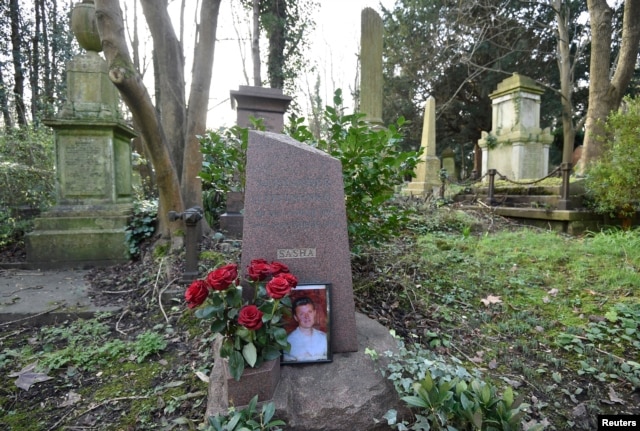Britain Under Pressure to Punish Putin Over Litvinenko Poisoning

Britain’s inquiry concluded the murder was probably approved by Russian President Vladimir Putin.
Cameron, who received the inquiry report earlier in the week, reacted after its release, calling the murder a “state-sponsored action” that was “appalling.” The British leader said his government has added further asset freezes against individuals involved and is “toughening” its action against Russia.
The British government also said it would summon the Russian ambassador as part of an effort to quell the anger of critics who call the response weak.
The grave of murdered ex-KGB agent Alexander Litvinenko is seen at Highgate Cemetery in London, Britain, Jan. 21, 2016.
Stepping lightly with Putin
Analysts say Britain’s strategic and economic interests will prevent it from doing anything that would further alienate the Putin government.
Strategically, Britain needs Russia’s cooperation in efforts to end the Syria conflict.
“Because of Russia’s role as a key backer of [President Bashar al-] Assad, it has lines open to Damascus that the Brits simply cannot match, so that in a way Russia is almost a necessary evil for Britain in dealing with the Syria crisis,” said Nicholas Redman, a Russia analyst at the International Institute for Strategic Studies in London.
With British warplanes now carrying out bombing campaigns against militants in Syria at the same time as Russian forces, it is also important for London to keep the lines of communication open with Moscow at a military-to-military level.
Calls for punitive action
Activists, politicians and members of Litvinenko’s family are calling for tougher penalties.
Marina Litvinenko, the slain dissident’s widow, called on the Cameron government to expel all Russian intelligence operatives from Britain, impose targeted sanctions against individuals involved in the murder, and even put into place a travel ban on Putin.
Bill Browder, a London-based financier and human rights activist who has frequently criticized Russia over the Litvinenko affair, called for a stronger response by Britain; but, he says he believes economic and financial interests are in the way, with Russian investors pouring billions into Britain’s banking and real estate sectors.
“There’s a lot of Russian money sloshing around London and I believe that there’s a concern among certain members of the government that that money would be less available if Britain took a moral stand on some of these issues,” Browder told VOA.
Even if the British government did decide to extend sanctions, there would be a few more penalties left to impose on Putin, said Redman. Britain was among those leading efforts to impose sanctions on Russia for its involvement in Ukraine. “A large proportion of the arsenal in terms of sanctions and other measures has already been expended,” he said.


